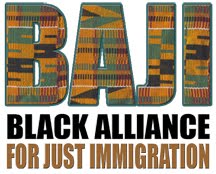The Black Alliance for Just Immigration and Priority Africa Network
Invite you to:
Black Intersections on Migration
National Conversations on African, African American,
Afro-Caribbean and Afro-Latino Migrations to and in the U.S.
A four-part series of teleconference briefings
on timely and critical analyses of migration, race, and identity.
The United Nations has declared 2011 as the “International Year for Peoples of African Descent”. Ten years ago, landmark recommendations were made at the World Conference against Racism, Racial Discrimination, Xenophobia and Related Intolerance in Durban South Africa. In a four-part series of teleconferences that looks at the span of Black presence in the U.S. over the centuries, we will examine the unique migration experiences of the African Diaspora within the context of U.S. history and the current debate over immigration. The series brings provocative frameworks and analyses into the discussion about race and immigration that are seldom considered.
Teleconference II
African American Migrations--The Exodus from the U.S. South
Thursday, February 24, Noon Pacific, 1PM Mountain, 2PM Central ; 3PM Eastern
See event on
Facbook - http://www.facebook.com/#!/event.php?eid=165679993481901
Speaker: Walter Turner, Professor, Social Science & Contemporary African Affairs, College of Marin, Kentfield, CA
Walter Turner will present his views on and analysis of the book, "The Warmth of Other Suns: The Epic Story of America's Great Migration" by Pulitzer Prize-winning author Isabel Wilkerson. Ms. Wilkerson was invited to speak but was unable to participate due to scheduling conflicts.
In her review of the book, Janet Maslin of the New York Times wrote, "Ms. Wilkerson works on a grand, panoramic scale but also on a very intimate one, since this work of living history boils down to the tenderly told stories of three rural Southerners who immigrated to big cities from their hometowns."
Walter Turner is himself an author of "Oil for Nothing, Multinational Corporations, Environmental Destruction, Death and Impunity in the Niger Delta.” His commentaries have appeared in the Black Scholar and on Pacifica National News, Pambazuka News, Pacifica Radio and National Public Radio. He is also one of the authors of the book “No Easy Victories: African Liberation and American Activists over a Half Century, 1950-2000.” (Africa World Press 2007).
Toll-free Dial-in (US/Canada): 1-866-931-7845
International Dial-in: 1-310-374-4949
Conference Code: 707591
Please RSVP by calling (510) 663-2254 or sending an email to teleconference@blackalliance.org
Teleconference III – Thursday, March 31: New African Immigrants—Grappling with Concepts of Race and Identity
Speaker: Jackie Copeland Carson, PhD, President Copeland-Carson and Associates and author of “Creating Africa in America: Translocal Identity in an Emerging World City”.
Teleconference IV – Thursday, April 28: The Afro-Caribbean and Afro-Latino Migrations to the U.S.
Speaker: Janvieve Williams Comrie, Executive Director, Latin American and Caribbean Community Center
All briefings are at Noon Pacific, 1PM Mountain, 2PM Central & ; 3PM Eastern
 Pulitzer Prize-winning author Isabel Wilkerson who wrote the epic book, "The Warmth of Other Suns: The Epic Story of America's Great Migration". We will then have a discussion about the impact of The Great Migration on the African American community and on the United States as a whole. We will also talk about parallels with immigration to the United States, a comparison that Ms. Wilkerson alludes to in her interview.
Pulitzer Prize-winning author Isabel Wilkerson who wrote the epic book, "The Warmth of Other Suns: The Epic Story of America's Great Migration". We will then have a discussion about the impact of The Great Migration on the African American community and on the United States as a whole. We will also talk about parallels with immigration to the United States, a comparison that Ms. Wilkerson alludes to in her interview.





